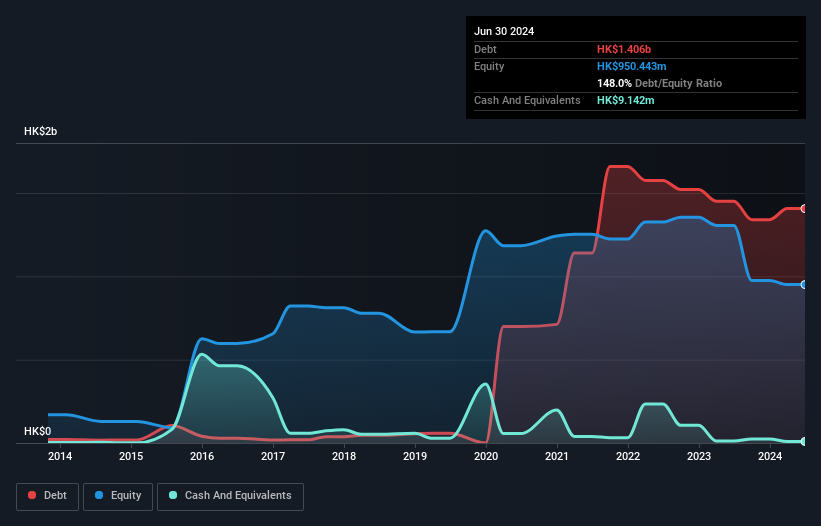
David Iben put it well when he said, 'Volatility is not a risk we care about. What we care about is avoiding the permanent loss of capital.' It's only natural to consider a company's balance sheet when you examine how risky it is, since debt is often involved when a business collapses. We note that DTXS Silk Road Investment Holdings Company Limited (HKG:620) does have debt on its balance sheet. But the more important question is: how much risk is that debt creating?
Why Does Debt Bring Risk?
Debt and other liabilities become risky for a business when it cannot easily fulfill those obligations, either with free cash flow or by raising capital at an attractive price. Ultimately, if the company can't fulfill its legal obligations to repay debt, shareholders could walk away with nothing. However, a more usual (but still expensive) situation is where a company must dilute shareholders at a cheap share price simply to get debt under control. Of course, plenty of companies use debt to fund growth, without any negative consequences. When we think about a company's use of debt, we first look at cash and debt together.
See our latest analysis for DTXS Silk Road Investment Holdings
How Much Debt Does DTXS Silk Road Investment Holdings Carry?
The chart below, which you can click on for greater detail, shows that DTXS Silk Road Investment Holdings had HK$1.41b in debt in June 2024; about the same as the year before. And it doesn't have much cash, so its net debt is about the same.

How Healthy Is DTXS Silk Road Investment Holdings' Balance Sheet?
We can see from the most recent balance sheet that DTXS Silk Road Investment Holdings had liabilities of HK$1.73b falling due within a year, and liabilities of HK$917.1m due beyond that. Offsetting these obligations, it had cash of HK$9.14m as well as receivables valued at HK$944.6m due within 12 months. So its liabilities outweigh the sum of its cash and (near-term) receivables by HK$1.69b.
This deficit casts a shadow over the HK$152.9m company, like a colossus towering over mere mortals. So we'd watch its balance sheet closely, without a doubt. After all, DTXS Silk Road Investment Holdings would likely require a major re-capitalisation if it had to pay its creditors today. When analysing debt levels, the balance sheet is the obvious place to start. But you can't view debt in total isolation; since DTXS Silk Road Investment Holdings will need earnings to service that debt. So when considering debt, it's definitely worth looking at the earnings trend. Click here for an interactive snapshot.
In the last year DTXS Silk Road Investment Holdings had a loss before interest and tax, and actually shrunk its revenue by 91%, to HK$53m. That makes us nervous, to say the least.
Caveat Emptor
Not only did DTXS Silk Road Investment Holdings's revenue slip over the last twelve months, but it also produced negative earnings before interest and tax (EBIT). Indeed, it lost HK$11m at the EBIT level. When you combine this with the very significant balance sheet liabilities mentioned above, we are so wary of it that we are basically at a loss for the right words. Sure, the company might have a nice story about how they are going on to a brighter future. But the reality is that it is low on liquid assets relative to liabilities, and it lost HK$301m in the last year. So we think buying this stock is risky. There's no doubt that we learn most about debt from the balance sheet. But ultimately, every company can contain risks that exist outside of the balance sheet. For example DTXS Silk Road Investment Holdings has 3 warning signs (and 2 which are potentially serious) we think you should know about.
If you're interested in investing in businesses that can grow profits without the burden of debt, then check out this free list of growing businesses that have net cash on the balance sheet.
Have feedback on this article? Concerned about the content? Get in touch with us directly. Alternatively, email editorial-team (at) simplywallst.com.
This article by Simply Wall St is general in nature. We provide commentary based on historical data and analyst forecasts only using an unbiased methodology and our articles are not intended to be financial advice. It does not constitute a recommendation to buy or sell any stock, and does not take account of your objectives, or your financial situation. We aim to bring you long-term focused analysis driven by fundamental data. Note that our analysis may not factor in the latest price-sensitive company announcements or qualitative material. Simply Wall St has no position in any stocks mentioned.